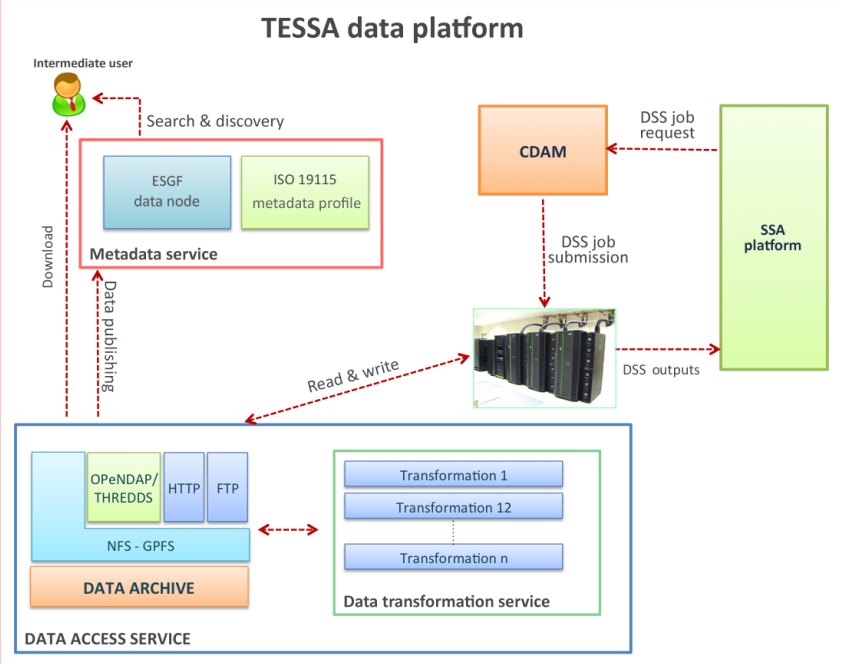Difference between revisions of "Template:Article of the week"
Shawndouglas (talk | contribs) (Fixed image) |
Shawndouglas (talk | contribs) (Updated article of the week text.) |
||
| Line 1: | Line 1: | ||
<div style="float: left; margin: 0.5em 0.9em 0.4em 0em;">[[File:Fig1 | <div style="float: left; margin: 0.5em 0.9em 0.4em 0em;">[[File:Fig1 D'Anca NatHazEarth2017 17-2.png|240px]]</div> | ||
'''"[[Journal | '''"[[Journal:A multi-service data management platform for scientific oceanographic products|A multi-service data management platform for scientific oceanographic products]]"''' | ||
An | An efficient, secure and interoperable data platform solution has been developed in the TESSA project to provide fast navigation and access to the data stored in the data archive, as well as a standard-based metadata management support. The platform mainly targets scientific users and the situational sea awareness high-level services such as the decision support systems (DSS). These datasets are accessible through the following three main components: the Data Access Service (DAS), the Metadata Service and the Complex Data Analysis Module (CDAM). The DAS allows access to data stored in the archive by providing interfaces for different protocols and services for downloading, variable selection, data subsetting or map generation. Metadata Service is the heart of the information system of TESSA products and completes the overall infrastructure for data and metadata management. This component enables data search and discovery and addresses interoperability by exploiting widely adopted standards for geospatial data. Finally, the CDAM represents the back end of the TESSA DSS by performing on-demand complex data analysis tasks. ('''[[A multi-service data management platform for scientific oceanographic products|Full article...]]''')<br /> | ||
<br /> | <br /> | ||
''Recently featured'': | ''Recently featured'': | ||
: ▪ [[Journal:MASTR-MS: A web-based collaborative laboratory information management system (LIMS) for metabolomics|MASTR-MS: A web-based collaborative laboratory information management system (LIMS) for metabolomics]] | |||
: ▪ [[Journal:The effect of a test ordering software intervention on the prescription of unnecessary laboratory tests - A randomized controlled trial|The effect of a test ordering software intervention on the prescription of unnecessary laboratory tests - A randomized controlled trial]] | : ▪ [[Journal:The effect of a test ordering software intervention on the prescription of unnecessary laboratory tests - A randomized controlled trial|The effect of a test ordering software intervention on the prescription of unnecessary laboratory tests - A randomized controlled trial]] | ||
: ▪ [[Journal:The state of open-source electronic health record projects: A software anthropology study|The state of open-source electronic health record projects: A software anthropology study]] | : ▪ [[Journal:The state of open-source electronic health record projects: A software anthropology study|The state of open-source electronic health record projects: A software anthropology study]] | ||
Revision as of 17:08, 19 June 2017
"A multi-service data management platform for scientific oceanographic products"
An efficient, secure and interoperable data platform solution has been developed in the TESSA project to provide fast navigation and access to the data stored in the data archive, as well as a standard-based metadata management support. The platform mainly targets scientific users and the situational sea awareness high-level services such as the decision support systems (DSS). These datasets are accessible through the following three main components: the Data Access Service (DAS), the Metadata Service and the Complex Data Analysis Module (CDAM). The DAS allows access to data stored in the archive by providing interfaces for different protocols and services for downloading, variable selection, data subsetting or map generation. Metadata Service is the heart of the information system of TESSA products and completes the overall infrastructure for data and metadata management. This component enables data search and discovery and addresses interoperability by exploiting widely adopted standards for geospatial data. Finally, the CDAM represents the back end of the TESSA DSS by performing on-demand complex data analysis tasks. (Full article...)
Recently featured:
- ▪ MASTR-MS: A web-based collaborative laboratory information management system (LIMS) for metabolomics
- ▪ The effect of a test ordering software intervention on the prescription of unnecessary laboratory tests - A randomized controlled trial
- ▪ The state of open-source electronic health record projects: A software anthropology study










